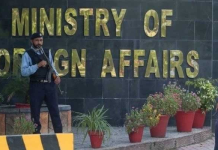Mahnoor Ansar
ISLAMABAD: While decarbonization is the need of the hour for Pakistan, it required some serious multi-level steps involving a blend of policy and advocacy, agreed a panel of experts at a roundtable discussion titled, “Decarbonazation of the Energy Sector: Options for Pakistan” organized by the Institute of Regional Studies (IRS). The discussion was organized by the Strengthening Climate Resilience Program at the Institute. The experts agreed that increasing global warming was mainly due to human-centric activities and required immediate attention. There was a need to de-couple human activities from the growing fossil fuel addiction and China had a crucial role in generation of alternate renewable energy resources, particularly his prime expertise of solar power generation in the whole world.
Dr Khalid Waleed, Research Lead on Energy at the Sustainable Development Policy Institute (SDPI) said that incentivization of the renewable energy sector was imperative in the present times. He added that currently Pakistan was surrounded with challenge(s) of Economy, Energy and Environment (the three Es) which required immediate attention. The fact that the three were interlinked made it increasingly difficult to address them individually. Expensive fuel imports annually had resulted in gradual shift to utilizing carbon-based solutions to fulfill energy needs at home and this had multiplied the aforementioned challenge manifold. A coordinated integration of our renewable energy and environment policy with our economic policy was the need of the hour, he proposed. Dr khalid Waleed further said that it was important to realize that mere limiting carbon utilization in the power sector was not enough for Pakistan to achieve complete decarbonization we need use minimalistic approach in our life style. In terms of incentivization of the renewable energy sector, sector coupling could be considered as one approach to move forward in addition to infrastructure development and public awareness.
Mr Syed Aqeel Hussain Jafri, Director Policy and International Cooperation at Alternative Energy Development Board (AEDB) said that energy transition was a global phenomenon at present and that different countries across the globe had already transitioned into utilizing clean energy options, keeping in consideration the factor of climate change. He said that Pakistan’s energy situation had some peculiarities wherein the country had hydro-based power generation mechanisms during the 70s and 80s which eventually transformed into fossil fuel usage later on. There was a serious need to formulate long-term plans for power generation as was done in the energy sector globally, he added. Additionally, complete decarbonization required a total overhaul of lifestyles and interventions on domestic, national and policy levels, he said.
Mr Song, Executive Deputy Director Port Qasim Electric Power Company (Private) Limited was of the opinion that economy was the fundamental issue for Pakistan right now. With the right amount of capital in hand Pakistan could avail numerous opportunities to improve its power generation. One proposition could be to combine small hydro projects with gas turbine generators to maximize output, he said. He added that a smart metering system could also be used to improve the current situation.
Ambassador Nadeem Riyaz, President Institute of Regional Studies (IRS) in his concluding remarks said that the challenges for Pakistan were immense, including energy shortfalls, environmental hazards, an underperforming economy, governance challenges and lack of data which was an impediment in research and development on critical areas of concern. Most important issue however, he added, was the inconsistency in policy execution. As a way forward, it was imperative for Pakistan to deal with its inconsistent energy demand patterns, appropriate usage of resources in agricultural sector, and water wastage, coordinated advocacy campaigns to raise awareness about the reality of climate change and its related challenges among the people. Additionally, there was a need for development of a stable policy as instability on the policy front was a major impediment to financing and attracting more foreign contracts, he said.
















